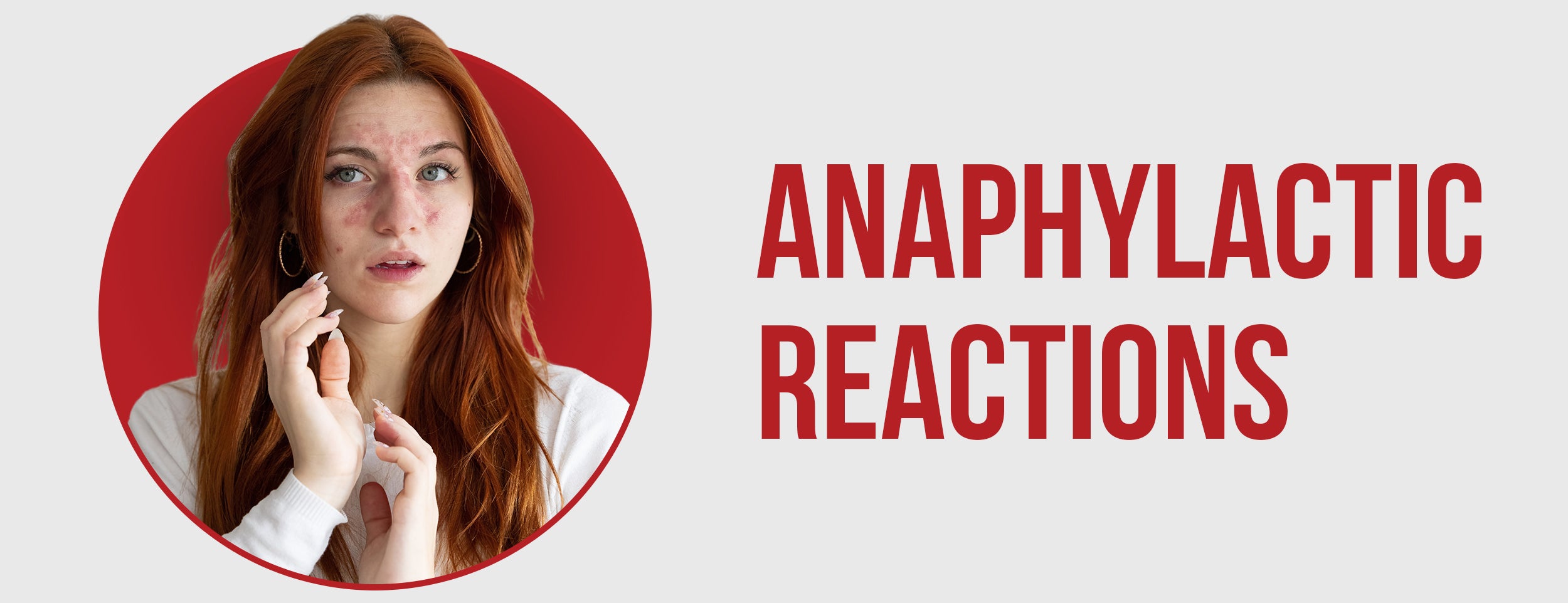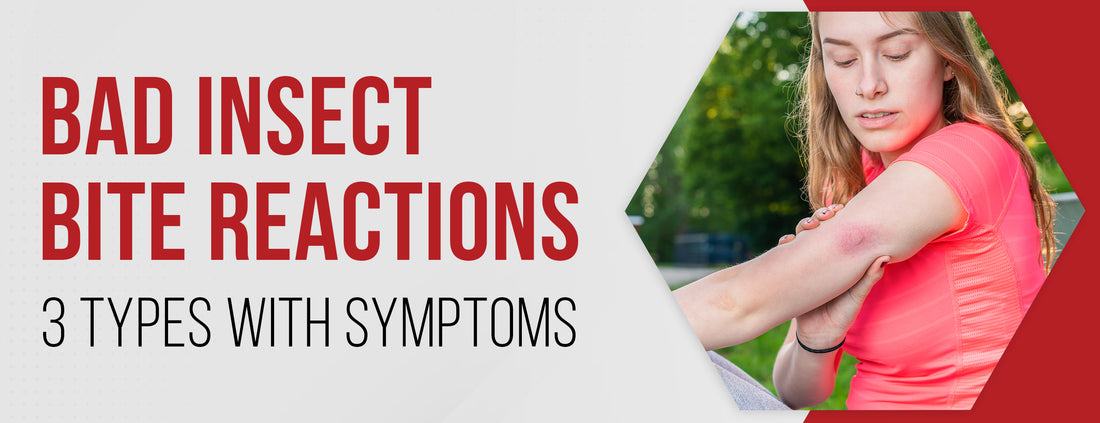Insect bites may seem like a minor inconvenience, but they can quickly turn into a life-threatening situation. It's not uncommon to experience mild swelling or redness around the site of a bite, but some people can have severe reactions that can be dangerous.
Anaphylaxis, a severe allergic reaction, can happen within minutes of being stung. Other symptoms include hives, itching, swelling, abdominal cramps, vomiting, and intense nausea or diarrhea. The most severe reactions can cause chest tightness and difficulty breathing, which requires immediate medical attention.
In cases like these, epinephrine (adrenaline) is typically administered in an auto-injector to prevent the allergic reaction from worsening. Even with treatment, the aftermath of anaphylaxis can be quite severe, as patients can experience dizziness or a sharp drop in blood pressure.
This blog post explores how bad insect bite reactions can be, including the symptoms and potential remedies.
Bad Insect Bite Reactions: 3 Types

A bad Insect bite reaction can range from mild irritation to severe allergies. Anaphylaxis, requiring immediate medical attention, is characterized by swelling, itching, pain, and redness. Proper treatment requires the identification of the reaction type.
Localized Reactions
A bad insect bite or sting usually produces a localized reaction. A bite reaction includes symptoms such as hives, pain, swelling, and redness beyond the sting site. The most common treatment for localized reactions is washing the area with soap and water and applying ice to reduce swelling. These reactions are usually unserious and will resolve independently within a few days.
It is important to monitor the bite site to ensure that it does not become infected. A localized reaction is uncomfortable but not dangerous and can be treated with antihistamines or anti-itch creams.
Systemic Reactions
There can be serious reactions to bad insect bites known as systemic reactions. They can cause the body to have an allergic response that affects more than just the area where the bite occurred. An individual with severe cases may develop hives, have a rapid heartbeat, or experience swelling of the face, lips, throat, or tongue.
Venom and gastrointestinal distress are poorly understood, but venom may cause inflammation of the gastrointestinal tract. The symptoms can be life-threatening and need to be treated right away. Treatment for systemic reactions may include intravenous fluids and anti-inflammatory medications.
Anaphylactic Reactions

An anaphylactic reaction occurs when the body's immune system reacts suddenly and dramatically to an insect bite. They typically occur within minutes of stings and can cause tightness in the chest, difficulty breathing, rapid heartbeat, abdominal cramps, vomiting, nausea, and diarrhea.
Anaphylactic shock occurs when the immune system overreacts to the venom, causing a dangerous drop in blood pressure. In severe cases, anaphylaxis can also lead to unconsciousness or cardiac arrest. Prompt medical attention is necessary, and people with known allergies should carry an EpiPen for emergency treatment.
3 Common Symptoms of Bad Insect Bite Reaction
A bad insect bite reaction usually results in redness, swelling, pain, and itching. The symptoms include blistering, hives, difficulty breathing, and anaphylactic shock.

Hives, Itching, And Swelling In Areas Other Than The Sting Site
Bad Insect bites are common during the warmer months, and while most people experience mild reactions, others may experience severe symptoms. People commonly report having hives, itching, and swelling in areas other than the sting site.
Symptoms can include redness, swelling, and skin itching caused by the immune system reacting to the insects' saliva. In severe cases, hives can spread to other body parts, causing discomfort, pain, and embarrassment.
Abdominal Cramping, Vomiting, Intense Nausea, or Diarrhea
It can be alarming to experience abdominal cramps, vomiting, nausea, or diarrhea after an insect bite because they may indicate that the venom has entered the bloodstream and is affecting digestion.
They are usually related to spider bites, tick bites, wasp bites, hornet bites, and bee bites, but they can also occur after ant bites. Any of these symptoms should be treated right away.
Tightness In The Chest And Difficulty In Breathing

In some cases of bad insect bite reactions, an individual may experience tightness in the chest and difficulty breathing. This is often a sign of anaphylaxis, a severe allergic reaction that can occur within minutes of a sting. It is usually triggered by the body's immune system overreacting to the venom injected by the insect.
Bees, wasps, and hornets are the most common insects that cause anaphylaxis. People with allergies, asthma, or severe insect bite reactions should always carry an epinephrine auto-injector. Anaphylaxis may occur in individuals who already have allergies to insect venom. Providing immediate medical attention and treatment, such as adrenaline, is crucial.
3 Causes of Bad Insect Bite Reaction
Insect bite reactions can be triggered by allergens in insect venom, past sensitization to previous bites, and genetics.
Allergies To Insect Venom:
It's common for bad insect bite reactions to be caused by venom allergies. Some people may be allergic to the venom of insects such as bees, wasps, hornets, and yellow jackets. Symptoms include difficulty breathing, hives, lips, tongue, and throat swelling, vomiting, lightheadedness, and even loss of consciousness.
Insects most commonly causing allergic reactions are bees, wasps, hornets, fire ants, and some mosquitoes, flies, and ticks. In severe cases, an insect sting can be life-threatening and require immediate medical attention. Avoiding insects, wearing protective clothing, and carrying an epinephrine pen can reduce the risk of allergic reactions.
Previous Reactions To Insect Bites:
Individuals who have previously had bad reactions to insect bites are at a higher risk of experiencing them again. The immune system is more likely to react to subsequent exposures once sensitized to a particular venom.
Repeated exposure to insect venom can also increase the severity of the allergic response. Insect bite victims with a history of severe systemic reactions should carry epinephrine auto-injectors and seek medical attention immediately.
Genetics:

Genetics can also play a role in bad insect bite reactions. Some people may have an inherited predisposition to develop allergies to certain types of insects. A genetic component has been demonstrated to be associated with allergic reactions to stinging insects, and these genes are involved in the immune response.
Researchers must identify the specific genes involved and how they contribute to insect venom allergies. A family history of allergies can help you identify your risk for bad insect bite reactions and take appropriate measures to prevent them.
3 Preventions And Treatments of Bad Insect Bite Reactions:
Prevention involves protective clothing and repellents to avoid allergen exposure. Treatment may require antihistamines for relief or epinephrine injections for severe reactions.
Avoiding Known Allergens:
Sometimes, bad insect bites can trigger severe allergic reactions in people sensitive to specific allergens. These allergic reactions are known as anaphylaxis and can be life-threatening if not treated promptly. A rapid heartbeat, hives, and difficulty breathing are all symptoms of anaphylaxis. If an individual knows they have an allergy, they should avoid contact with those insects.
Wearing Protective Clothing:
Preventing bad insect bites is easy with protective clothing. A bite through protective clothing may result in a worse reaction than a bite on exposed skin. Wearing a tight dress can compress an insect bite, causing severe swelling. When clothing does not allow moisture to escape, infection is more likely.
Use of Insect Repellent:

Insect repellent is a great way to prevent bites from mosquitoes, ticks, and other biting insects. Biting insects can transmit diseases and cause allergic reactions, so take preventative measures. Use an insect repellent on any exposed skin surface not covered by clothing.
Always follow the instructions on the product and reapply as necessary. The use of certain types of repellent has also led to severe side effects, including seizures and breathing difficulties. It is important to use a safe repellent for one's needs.
Medical Treatment
In cases of severe bad insect reactions, medical treatment is essential. Epinephrine injections can counteract anaphylactic shock, and antihistamine medications relieve symptoms.
Epinephrine Injections:
Treatment of severe allergic reactions caused by insect bites requires epinephrine injections. In the event of anaphylaxis, this medication can reverse the life-threatening effects, such as constricted airways, low blood pressure, and rapid heartbeat.
Epinephrine improves breathing and blood flow by relaxing airway muscles and constricting blood vessels. A bad insect bite allergy can have devastating consequences if not treated promptly.

Antihistamine Medications:
An antihistamine medication reduces the symptoms of redness, itching, and swelling caused by insect bites. They work by blocking histamine, a chemical released by the body during an allergic reaction. Various antihistamines exist, such as first and second-generation antihistamines, which differ in effectiveness and side effects.
Over-the-counter products, such as Benadryl or Curist Allergy Relief, may provide immediate relief, but consult a healthcare professional if symptoms persist.
Importance of Seeking Medical Attention:
You should seek medical attention if you experience an allergic reaction to an insect bite. Some reactions can be severe and potentially life-threatening. Dizziness and difficulty breathing are symptoms of a severe reaction. Prevention and proper treatment can be achieved by seeking medical attention early on. The severity of the reaction can rapidly escalate, even resulting in death. Avoid further complications by seeking medical attention right away.
Conclusion
Bad insect bite reactions are not to be taken lightly. Recognizing the types of reactions, understanding the symptoms, and identifying potential causes can save lives. Prevention through preventive measures and seeking prompt medical attention when symptoms arise are crucial steps in mitigating the impact of these reactions.
By taking bad insect bite reactions seriously and acting swiftly, individuals can ensure their well-being and enjoy the great outdoors without unnecessary risks.








